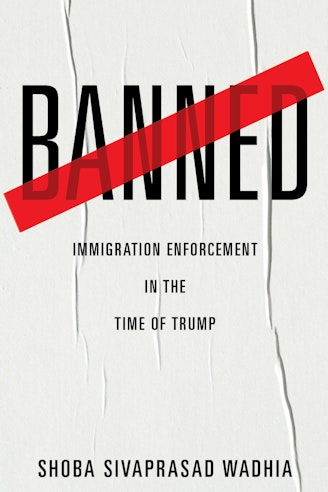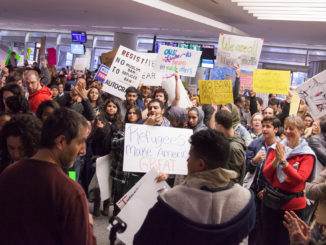—Shoba Sivaprasad Wadhia and Mahsa Khanbabai
We are immigration attorneys who witnessed first-hand how immigration policies directly impacted Muslims, Arabs, and South Asians with the NSEERS registration program in 2002. Thirteen years later, we tasted something harsher when candidate Donald J. Trump announced a “total and complete shutdown” of Muslim immigration.
As president, Trump implemented a series of bans, the first of which blocked immigration for all nationals from seven Muslim majority countries. After legal challenges, the final version of the ban was issued as a “proclamation,” and blocks the entry for all immigrants and some visitors from five majority-Muslim nations – Iran, Libya, Somalia, Syria and Yemen plus North Korea and certain visitors from Venezuela. It was upheld by the Supreme Court on June 26, 2018. While the proclamation includes a nominal “waiver” for certain individuals to enter the United States despite the ban, the reality is that obtaining a waiver is extraordinarily difficult. In fiscal year 2018, only 6% of these waivers, and possibly less, were approved, according to a former Department of State official.
Like many of the individuals and families we have counseled as immigration lawyers, we are also mothers and an immigrant and child of immigrants from Iran and India, intimately familiar with the time-consuming and crippling delays immigrants face even without a discriminatory ban.
The travel ban and a failed waiver process comes with a grave human cost. One recent example involves a U.S. citizen and her Iranian husband. Due to the ban and pending waiver, they were unable to move to the United States. The U.S. citizen gave birth in Iran. She just learned that her father was diagnosed with cancer. Because of the ban, she is in a tragic place where she must decide between being with her husband in Iran with their new baby or being by her father’s side in the United States, separated from her husband. Her case gives credence to Justice Breyer’s concern that the waiver may amount to “window dressing.” As documented in the forthcoming book Banned, the ban has kept a new bride from joining her American husband in the United States, a parent from being able to witness the birth of her grandchild, and another from witnessing his son’s college graduation. These are moments they will never get back.
Fortunately, a group of leaders in Congress is preparing to introduce legislation on April 10 to redress the fall out of the ban. Known as the “National Origin-Based Antidiscrimination for Nonimmigrants Act” or the “NO BAN Act,” the bill terminates the proclamation and limits provisions in the immigration statute the administration exploited to enact the travel ban. The bill also strengthens the waiver process for those in close family relationships or with humanitarian factors. Fifty-six immigration law teachers and scholars have issued a letter in support of the bill, concluding that it “provides a common sense and humanitarian solution in response to the outcome in Trump v. Hawaii.”
 Shoba Sivaprasad Wadhia is the Samuel Weiss Faculty Scholar and Founding Director of the Center for Immigrants’ Rights Clinic at Penn State Law- University Park. She is the author of Beyond Deportation: The Role of Prosecutorial Discretion in Immigration Cases and a forthcoming book, Banned: Immigration Enforcement in the Time of Trump (NYU Press).
Shoba Sivaprasad Wadhia is the Samuel Weiss Faculty Scholar and Founding Director of the Center for Immigrants’ Rights Clinic at Penn State Law- University Park. She is the author of Beyond Deportation: The Role of Prosecutorial Discretion in Immigration Cases and a forthcoming book, Banned: Immigration Enforcement in the Time of Trump (NYU Press).
Mahsa Khanbabai is founder of Khanbabai Immigration Law and Chair Elect of the American Immigration Lawyers Association New England Chapter. She has pursued many travel ban cases and obtained one of the first waivers granted.
Featured image from Wikimedia Commons.

